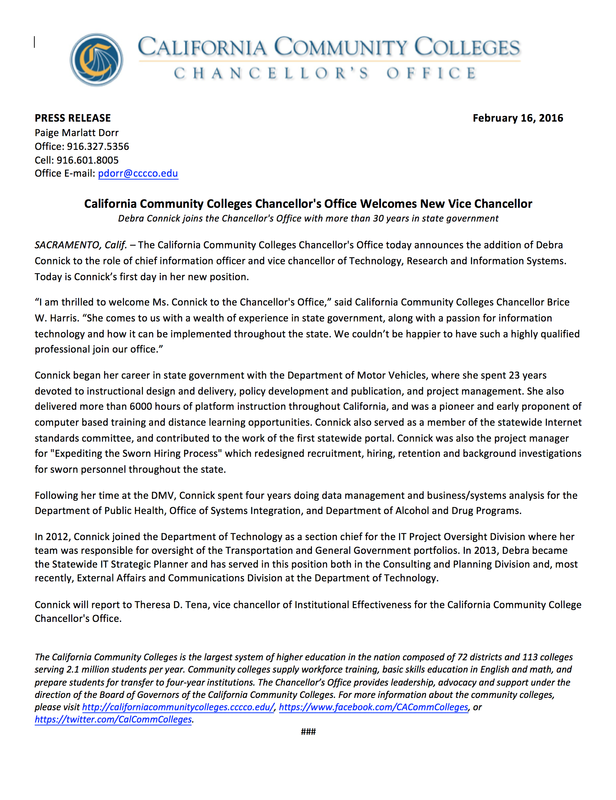SACRAMENTO, Calif. – As student government leaders from around the state gather in Sacramento for their general assembly, the California Community Colleges Chancellor’s Office on Thursday reminded students, including undocumented students, that financial aid remains available for them to pursue their educational goals.
“While the presidential election has been divisive and has sparked anxiety and uncertainty on our campuses, we will always embrace the values of inclusion and diversity and support all students who want to build better lives for themselves and their communities,” said Interim Chancellor Erik E. Skinner. “No student should forgo the opportunity to apply for financial assistance at our colleges.”
In California, in-state enrollment fees and state financial aid -- including fee waivers, Cal Grant and privately funded institutional scholarships -- are available to certain undocumented students, or Dreamers. These benefits are protected by California law, and more information can be found by clicking on the “Dream Act” link at icanaffordcollege.com.
Skinner also noted that community college financial aid and student services professionals are available to support undocumented students, and several colleges have on-campus Dream Centers.
“We look forward to joining the leaders of the Student Senate for the California Community Colleges this weekend to reaffirm our commitment that our colleges are welcoming and supportive for students of all backgrounds,” said Skinner, who added that the community college system will continue to work closely with the University of California and California State University systems on supporting all students.
The California Community Colleges is the largest system of higher education in the nation composed of 72 districts and 113 colleges serving 2.1 million students per year. Community colleges supply workforce training, basic skills education in English and math, and prepare students for transfer to four-year institutions. The Chancellor’s Office provides leadership, advocacy and support under the direction of the Board of Governors of the California Community Colleges. For more information about the community colleges, please visit http://californiacommunitycolleges.cccco.edu/, https://www.facebook.com/CACommColleges, or https://twitter.com/CalCommColleges.
“While the presidential election has been divisive and has sparked anxiety and uncertainty on our campuses, we will always embrace the values of inclusion and diversity and support all students who want to build better lives for themselves and their communities,” said Interim Chancellor Erik E. Skinner. “No student should forgo the opportunity to apply for financial assistance at our colleges.”
In California, in-state enrollment fees and state financial aid -- including fee waivers, Cal Grant and privately funded institutional scholarships -- are available to certain undocumented students, or Dreamers. These benefits are protected by California law, and more information can be found by clicking on the “Dream Act” link at icanaffordcollege.com.
Skinner also noted that community college financial aid and student services professionals are available to support undocumented students, and several colleges have on-campus Dream Centers.
“We look forward to joining the leaders of the Student Senate for the California Community Colleges this weekend to reaffirm our commitment that our colleges are welcoming and supportive for students of all backgrounds,” said Skinner, who added that the community college system will continue to work closely with the University of California and California State University systems on supporting all students.
The California Community Colleges is the largest system of higher education in the nation composed of 72 districts and 113 colleges serving 2.1 million students per year. Community colleges supply workforce training, basic skills education in English and math, and prepare students for transfer to four-year institutions. The Chancellor’s Office provides leadership, advocacy and support under the direction of the Board of Governors of the California Community Colleges. For more information about the community colleges, please visit http://californiacommunitycolleges.cccco.edu/, https://www.facebook.com/CACommColleges, or https://twitter.com/CalCommColleges.



 RSS Feed
RSS Feed
